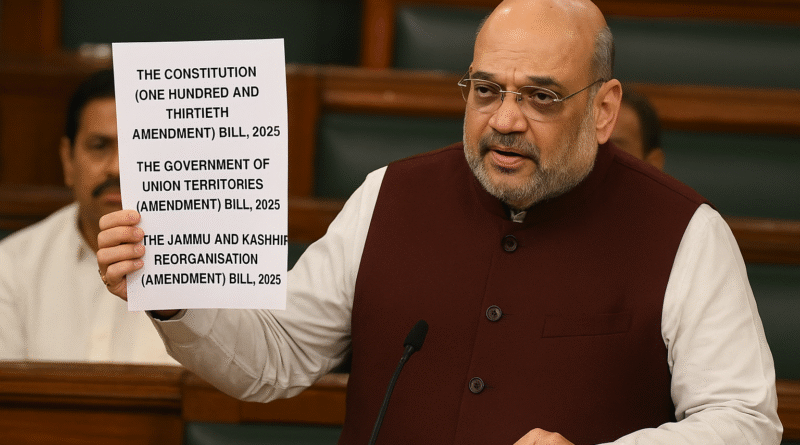The Impact of the Tainted Minister Removal Bills on Indian Democracy
Impact of the Tainted Minister Removal Bills on Indian Democracy : The recent introduction of three new bills by Union Home Minister Amit Shah in the Lok Sabha has sent shockwaves through the political landscape of India. These bills—the Constitution (One Hundred and Thirtieth Amendment) Bill, 2025; the Government of Union Territories (Amendment) Bill, 2025; and the Jammu and Kashmir Reorganisation (Amendment) Bill, 2025—aim to create a legal framework for the mandatory removal of a Prime Minister, Chief Minister, or minister if they are arrested and detained for 30 consecutive days on charges that carry a prison term of five years or more. This move is being seen as a political masterstroke by the BJP, leaving opposition parties in a state of alarm.
The immediate reaction from the opposition to this amendment must have been similar to the entry of Rocky Bhai in the film KGF, where everyone is left stunned and helpless. However, the potential negative repercussions of this amendment could be far-reaching and deeply impact Indian democracy.
Consider this scenario: in the next general or state elections, if the public votes an opposition leader into power, the ruling BJP, which holds the power, could potentially misuse this amendment. They could frame the opposition leader in a scam or other charges, initiate a CBI investigation, and have them arrested. If they can manage to keep the leader detained for 30 days, the President could terminate the Prime Minister, or the Prime Minister could remove a Chief Minister. The people’s votes, cast with great effort, would become worthless, and their chosen representative would be removed from office. This raises serious questions about the value of the democratic voting process.
Some might even call this a form of dictatorship, a system where the public’s vote has no real value. This masterstroke by a brilliant Home Minister raises a fundamental question: Is such a move even permissible under the current Indian Constitution? The answer is no. This is a new amendment being proposed by the BJP government.
Currently, the Indian Constitution, specifically Articles 75 and 164, does not have a provision for the automatic removal of a minister solely based on arrest or detention. The disqualification of a Member of Parliament (including a minister) has traditionally been triggered by a criminal conviction with a sentence of two years or more, as specified in the Representation of the People Act, 1951.
One must wonder if this “masterstroke” is another attempt to divert public attention. With Rahul Gandhi’s persistent scrutiny of the BJP over alleged vote fraud, the government is facing some pressure. Could this amendment have been introduced to shift the focus? It seems to have had little effect on the Congress party, particularly on Rahul Gandhi.
The fate of this amendment will be decided through a vote in the Parliament soon. While opposition parties are expected to oppose it, and the fact of indian politics is that, the final result will be determined by the ruling party.
My intention with this analysis is not to blame any political party but to offer a critical perspective on the potential implications of this proposed legislation. If you believe this amendment is a positive step, please share your thoughts.

